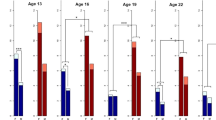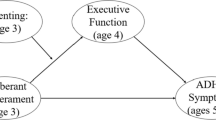Abstract
Predictors of premature withdrawal from a 12-week program of behavioral conditioning for childhood nocturnal enuresis were examined for 47 children treated at a university outpatient clinic. All children were administered the Piers-Harris Children's Self-Concept Scale; parents completed the 55-item Behavior Problem Checklist and the Tolerance Scale for Enuresis. Parents also reported the methods (i.e., random awakening, restriction of fluids, rewards,punishment, medication, other) previously used to control their child's wetting. A stepwise discriminant function analysis revealed that the function containing number of previous techniques used, presence of child behavior problems, and parent tolerance of enuresis was a significant predictor of early termination of treatment.
Similar content being viewed by others
References
DeLeon, G., & Mandell, W. (1966). A comparison of conditioning and psychotherapy in the treatment of functional enuresis.Journal of Clinical Psychology, 22 326–330.
Doleys, D. (1977). Behavioral treatments for nocturnal enuresis in children: A review of the recent literature.Psychological Bulletin, 84, 30–54.
Forsythe, W., & Redmond, A. (1974). Enuresis and spontaneous cure rate: Study of 1129 enuretics.Archives of Diseases of Children, 49, 259–263.
Geffken, G., Johnson, S., & Walker, D. (1986). Behavioral interventions for childhood nocturnal enuresis: The differential effect of bladder capacity on treatment progress and outcome.Health Psychology, 5, 261–272.
Johnson, S. (1980). Enuresis. In R. Daitzman (Ed.),Clinical behavior therapy and behavior modification (Vol. 1, pp. 81–142). New York: Garland Press.
Morgan, R., & Young, G. (1975). Parental attitudes and the conditioning treatment of childhood enuresis.Behaviour Research and Therapy, 13, 197–199.
Peterson, D. (1961). Behavior problems of middle childhood.Journal of Consulting Psychology, 25, 205–209.
Piers, E., & Harris, D. (1969).The Piers-Harris Children's Self-Concept Scale. Nashville, TN: Counselor Recordings and Tests.
Sacks, S., DeLeon, G., & Blackman, S. (1974). Psychological changes associated with conditioning functional enuresis.Journal of Clinical Psychology, 30, 271–276.
Turner, R., Young, G., & Rachman, S. (1970). Treatment of nocturnal enuresis by conditioning techniques.Behaviour Research and Therapy, 8, 367–381.
Wagner, W. (1987). The behavioral treatment of childhood nocturnal enuresis.Journal of Counseling and Development, 65, 262–265.
Wagner, W., Johnson, S., Walker, D., Carter, R., & Wittmer, J. (1982). A controlled comparison of two treatments for nocturnal enuresis.Journal of Pediatrics, 101, 302–307.
Author information
Authors and Affiliations
Rights and permissions
About this article
Cite this article
Wagner, W.G., Johnson, J.T. Childhood nocturnal enuresis: The prediction of premature withdrawal from behavioral conditioning. J Abnorm Child Psychol 16, 687–692 (1988). https://doi.org/10.1007/BF00913478
Revised:
Issue Date:
DOI: https://doi.org/10.1007/BF00913478




